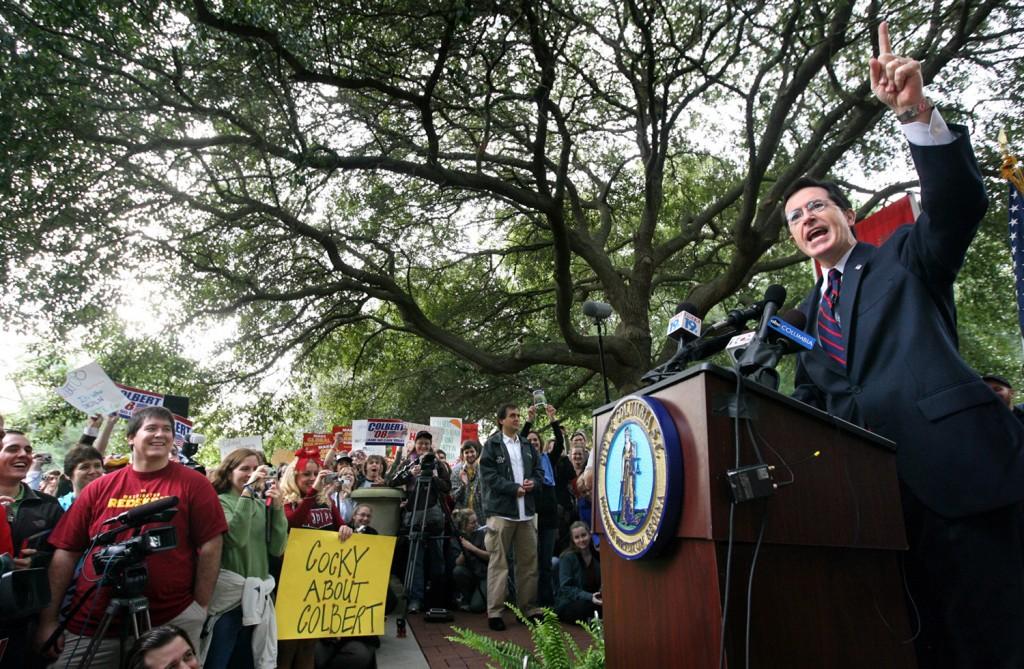South Carolina’s “Favorite Son” Eyes the Oval Office
May 29, 2011

Published: November 8, 2007
Stephen Colbert returned to the “Daily Show” on Oct. 16, towed in behind a bicycle pedaled by a man in an Uncle Sam Costume, to announce that, “I, Stephen Colbert, am officially announcing that I will officially consider whether or not I will announce that I am running for president of the United States.”
Later that night on his own show, “The Colbert Report,” Colbert announced to his viewers, “Well, after nearly 15 minutes of soul-searching I have heard the call. Nation, I shall seek the office of the President of the United States!” Red, white and blue balloons cascaded down from the ceiling as America’s “favorite son” (or so he hopes to be) celebrated his Presidential hopefulness.
Just how serious was his bid for the office of the President? Apparently serious enough for his staff members to have contacted both the Democratic and Republican committees before he made his announcement.
Colbert was attempting to run on both the Democratic and Republican tickets in his home state of South Carolina.
Dena Ela, FCLC ’09, expressed apathy about his supposed duel-party loyalties. “He could do nothing worse to cripple the Republican or Democratic parties,” she said, “or even the political party in general, than anyone else has in the past.” When asked if she would ever vote for Colbert she responded, “I would feel as compelled to vote for him as I would for anyone else.”
A Facebook group called “1,000,000 Strong for Stephen T Colbert” was formed by a high school student the night that Colbert announced he would run for President. Just eight days later, the group had well over a million members. Similar groups for legitimate candidates have still not reached their goals of garnering a million supporters even months after their creation. Barack Obama’s group “One Million Strong for Barack” peaked at over 380,000 members after eight months, according to the BBC News. Katie Iberle, FCLC ’08, said of the disparity in members of the Facebook groups, “At least his popularity as a candidate is an interesting commentary on how the younger voting demographic views politics.”
Many were skeptical as to how serious Colbert was about running. Paulie Dibner, FCLC ’09, had mixed feelings on Colbert’s semi-serious bid for office. “Is Stephen Colbert the person running or is it his alter-ego that’s running?” he said. “He would make a fascinating leader, but at the end of the day is he doing it to stir up voters, to actually accomplish something or to just get attention?” Colbert stated in a television interview “I don’t want to be president. I want to run for president. There’s a difference.”
According to the New York Times, Colbert was running to receive enough votes to be given a single South Carolina delegate to next year’s Democratic Election. He stated, “Why else run as a favorite son if you’re not going to broker a convention? And if I get a delegate, it will be a brokered convention—unless they offer me to let me speak, then maybe I would turn over my delegate.”
Unfortunately for Colbert and his supporters, his bid received a stinging setback on Nov. 1, when the South Carolina Democratic Party voted to keep his name off the ballot. In a CNN article, state party chairwoman Carol Fowler cited standards of “national viability” that he had failed to meet. Apparently Colbert’s aims to win just one out of 50 U.S. states wasn’t convincing enough for Democrat leaders.
Of course, not everyone was enthused about the comedian’s faux-serious campaign. Dibner pointed out that Colbert would merely be “taking votes away from someone else. Anyone who would vote for Colbert would be someone who would vote for a Democrat.”
There is no doubt that Colbert’s bid for office, serious or not, has caused quite a stir in both college and political communities. And who knows – maybe in an era when voter turnout is at rock-bottom lows, particularly in the crucial 18-24 demographic, Colbert’s efforts, though foiled, were not in vain. America could use the kick in the pants.











